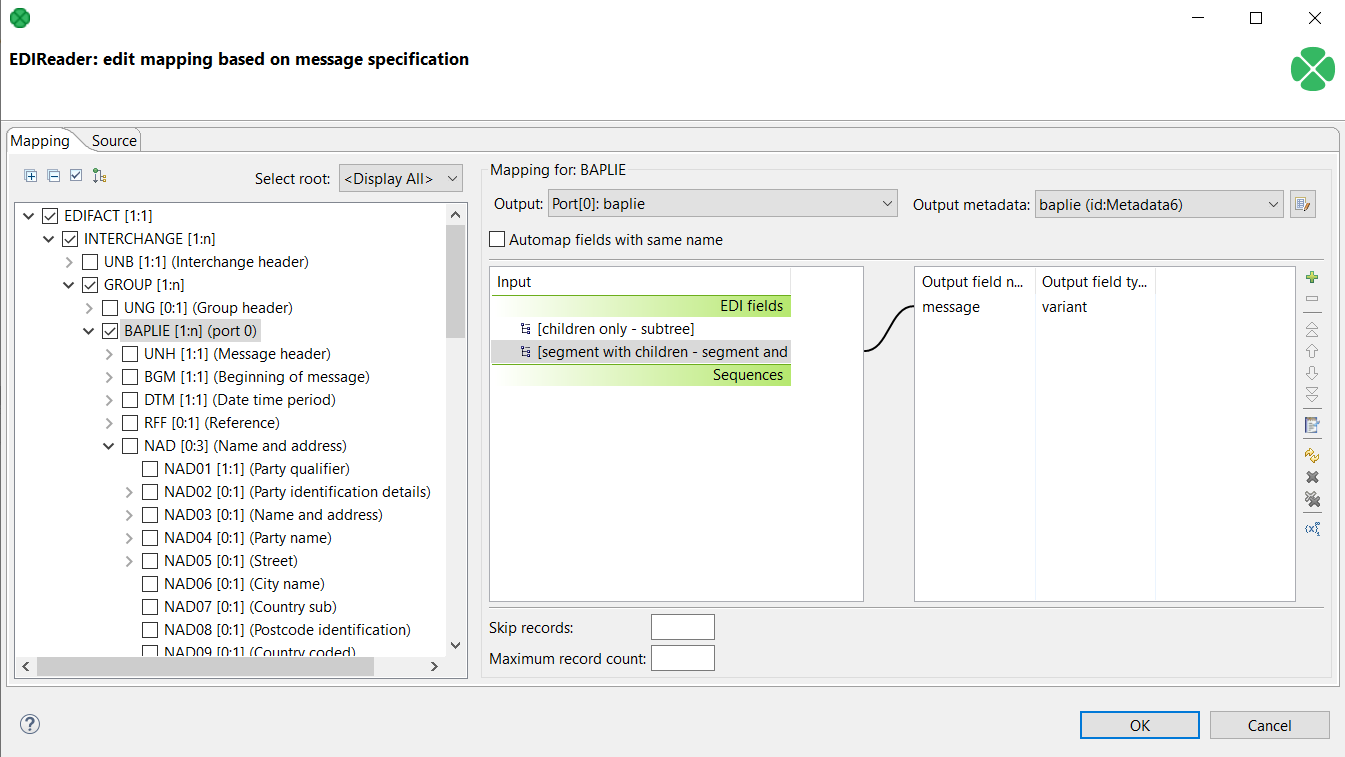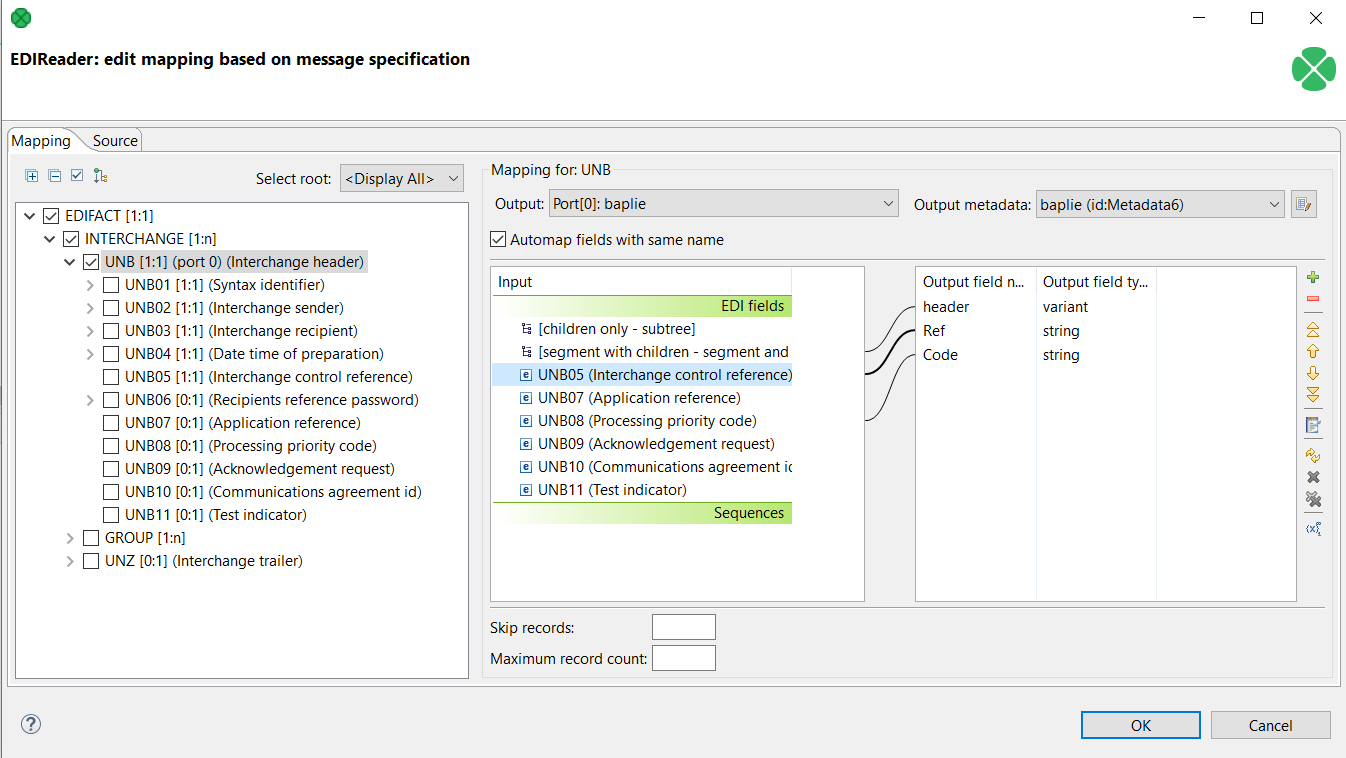
EDIFACTReader

Short Description
EDIFACTReader reads data in EDIFACT format.
All EDIFACT versions from D.93A to D.2~A are supported.
|
Please note that EDIFACTReader component is only available in certain CloverDX plans. To find out more about licensing requirements, please contact sales@cloverdx.com. |
| Data source | Input ports | Output ports | Each to all outputs | Different to different outputs | Transformation | Transf. req. | Java | CTL | Auto-propagated metadata |
|---|---|---|---|---|---|---|---|---|---|
EDIFACT file |
0-1 |
1-n |
⨯ |
✓ |
⨯ |
⨯ |
⨯ |
⨯ |
⨯ |
Ports
| Port type | Number | Required | Description | Metadata |
|---|---|---|---|---|
Input |
0 |
⨯ |
For port reading. See Reading from Input Port. |
One field ( |
Output |
0 |
✓ |
For correct data records |
Any[1] |
1-n |
For correct data records |
Any [1] (each port can have different metadata). |
| 1 |
Metadata on each output port does not need to be the same. Each metadata can use Autofilling Functions. |
Metadata
EDIFACTReader does not propagate metadata.
EDIFACTReader has a metadata template on its output port available.
Metadata on optional input port must contain string, byte or cbyte field.
Metadata on each output port does not need to be the same.
Each metadata can use Autofilling Functions.
EDIFACTReader Attributes
| Attribute | Req | Description | Possible values |
|---|---|---|---|
Basic |
|||
File URL |
yes |
Attribute specifying what data source(s) will be read (EDIFACT file, input port, dictionary). See Supported File URL Formats for Readers. |
|
EDIFACT version |
Attribute specifying version of EDIFACT message. |
||
EDIFACT message |
Attribute specifying type of EDIFACT message. Possible values depend on selected EDIFACT version. |
||
Mapping |
Mapping of the input EDIFACT structure to output ports. For more information, see XMLExtract Mapping Definition. |
||
Mapping URL |
Name of an external file, including its path which defines mapping of the input EDIFACT structure to output ports. For more information, see XMLExtract Mapping Definition. |
||
Advanced |
|||
Strict validation |
Enables strict validation of the incoming values, their sizes and data types. Also checks that composite elements are not present in places where only simple elements are allowed. Produces error if any validation check finds a problem. |
true (default) | false |
|
Details
EDIFACTReader reads data from EDIFACT files using SAX technology.
EDIFACTReader can read individual values or entire subtrees of the EDIFACT structure. Individual values can be converted to any field type. Subtrees can be converted to variant fields. When reading into variant fields, all data types in the field will be string type.
Using EDIFACTReader is very similar to XMLExtract. Attributes EDIFACT version and EDIFACT message define the expected structure (schema) of the input data. The schema is generated automatically.
Specifying EDIFACT version and EDIFACT message is optional. You can leave both attributes empty, in which case EDIFACTReader will read entire input data into a single variant field on first output port. Defining a mapping is not possible in this case.
EDIFACTReader Mapping Editor and Message Schema
EDIFACTReader Mapping Editor serves to define mapping from EDIFACT message structure to one or more output ports by drag and drop.
To be able to use the editor you have to specify EDIFACT version and EDIFACT message. The schema is created internally and cannot be modified.
Any other operations to set up mapping are described in above mentioned XMLExtract.
In EDIFACTReader, you can map input fields to the output in the same way as you map message fields. The input field mapping works in all three processing modes.
Examples
Mapping parts of EDIFACT message onto output metadata. It is possible to map a whole message or its part onto variant field or to map individual values to fields of other data types.


Compatibility
| Version | Compatibility Notice |
|---|---|
5.13 |
EDIFACTReader is available since 5.13.0. |
